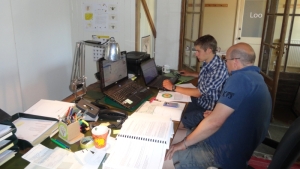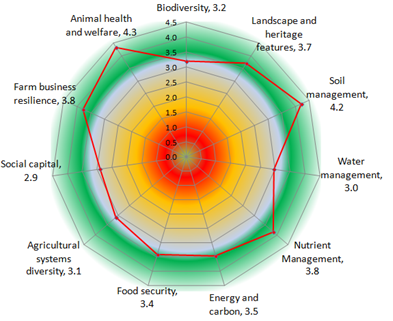
Acronym : PG tool
Contract Period : 01/07/2010 - 31/03/2011
Main Funder : Defra through Natural England. Followed by work funded through other projects.
ORC Staff Contact : Christian Gossel

The OCIS public goods project produced a tool which is designed to provide a simple, measurable and accessible way to show the ‘Public Goods’ that accrue through organic farming systems and the addition of an OELS agreement.
The project aimed to produce an excel-based tool which can be used to assess the public goods provided on a farm. These are split into separate areas of public good:
The tool provides a clear, easy-to-follow results page which a farmer can use to identify areas where there is potential for improvement and areas where the farm is above average.
ORC undertook the entire project.
The project developed the Public Goods Tool, which is a comprehensive sustainability assessment tool for farming systems. It offers a rapid and succinct overview of a farm’s performance, using a range of environmental, economic and social indicators. The tool can be used to identify areas for improvement and monitor changes over time. The assessment process is carried out with an advisor or researcher, with readily available sources of data being used to save time/avoid duplication of effort. The advisory focus of the tools facilitates a dialogue between the assessor and the farmer assessed. This allows for the identification of possible solutions to issues highlighted. The assessment process can also draw attention to the positive contributions a farm is making to society, above and beyond the food and other products leaving the farm gate.
Positive feedback from farmers and advisors involved in the pilot
“An assessment can really help give validity to what you’re doing and help you to focus on what you need to look at next or where there’s potential for doing something new”.
“It brings out stuff that is at the back of your mind to the forefront.”
“It has been a really useful exercise and I would encourage others to take advantage of it”
Gerrard, C.L., Smith, L.G., Padel, S., Pearce, B., Hitchings, R., Measures, M., Cooper, N., (2011), OCIS Public Goods Tool Development, Report for Defra.
Anon (2014) Application of the public goods tool on conventional farms. Final report to Defra OF0398.
Marchand F, Debruyne L, Triste L, Gerrard C, Padel S, Lauwers L. 2014. Key characteristics for tool choice in indicator-based sustainability assessment at farm level. Ecology & Society. 19:3.
Gerrard C, Smith L, Pearce B, Padel S, Hitchings R and Measures M., 2012 Public goods and farming. In: Farming for food and water security, 10. Sustainable Agriculture Reviews, no. 8380. Springer, Dodrecht Heidelberg New York London, pp. 1-22.
Smith LG, Padel S, Pearce B, Lampkin N, Gerrard C, Woodward L, Fowler S, Measures M 2011. Assessing the public goods provided by organic agriculture: lessons learned from practice, in The third scientific conference of ISOFAR: Organic is life – knowledge for tomorrow, Neuhoff, D., Halberg, N., Rasmussen, I.A., Hermansen, J., Ssekyewa, C., and Mok, S., Editors: Namyangju, Republic of Korea. p. 59-63.
Subsequently the PG Tool has been utilised in a wide range of situations and research projects. For the current work see the Public Goods tool project page. The most recent version of the tool is available here.
Various iterations and uses of the PG Tool are listed below:
Following the creation of the tool, it was the utilised and modified for various other projects. in 2012/13 the tool was used in the Sustainable Organic and Low Input Dairying (SOLID) EU project, adapting the tool to capture more dairy-related data and generating assessments on farms across Europe.
Key characteristics for tool choice in indicator-based sustainability assessment at farm level
As the tool was originally created for use in the OCIS, it had a particular focus on organic agriculture. In order to create a more general-use tool, Defra commissioned the adaptation and testing of the PG Tool on 32 conventional farms in 2014.
Evidence Project Final Report Defra OF0398
The EU project Towards Energetic Communities (TWECOM) in 2014/15 further adapted the PG Tool to explore landscape elements, focusing on wood, biomass, and hedges.
A report on adapting the PG tool to incorporate management of landscape elements for woodfuel
From 2013 to 2015, with support from Ekhagastiftelsen, ORC and the Research Institute of Organic Agriculture (FiBL) assessed PG Tool and other sustainability assessment tools in their coverage of the FAO Sustainability Assessment of Food and Agriculture systems (SAFA) framework.
As part of the Sustainable Intensification Project (SIP) the PG Tool was considered alongside other tools for identifying the indicators that are useful when assessing farms for sustainable intensification.
Sustainable Intensification Platform (1) Integrated Farm Management – LM0201
In 2016 the Flanders Research Institute for Agriculture (ILVO) conducted a literature review on sustainability assessment tools which included PG Tool.
Discerning the stars: characterising the myriad of sustainability assessment methods
The EU-funded iSAGE project started in 2016 and aimed to explore the Innovations for Sustainable Sheep and Goat Production in Europe. An adapted version was once again created and shared with all members for to generate sustainability assessments on various sheep and goat farms across the EU.
Sustainability Assessment of Goat and Sheep Farms: A Comparison between European Countries
Similar to the TWECOM project, from 2016 to 2019 SustainFARM explored the use of woody products in grazing systems. The PG Tool was used to provide an overall assessment of different farm and wood use types.
A Multi-factorial Sustainability Assessment of Five European Agroforestry Farms
The SEEGSLIP project, which finished in 2021, sought to understand the innovations in sustainable economic and ecological grazing systems. To do this members utilised the PG Tool with adaptations for compatibility with Farmbench and Agrecalc.
Pasture-fed production – findings from the SEEGSLIP project
Continuing the role of Defra in creation and support of the PG Tools, the Environment and Land Management Scheme Test & Trials adapted and evaluated the usability of PG Tools in the future of developing and assessing ELMs.
One year in, one year to go: Assessing Public Good delivery on farm
At the request of the Soil Association, the FAB Farmers EU project used PG Tools to explore the functional biodiversity of farms in 12 pilot regions across 5 counties from 2018 to 2022.
Report on baseline measurement of FAB performance of farms
EASI Programme (PDF 107KB)